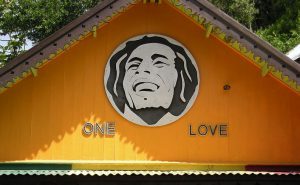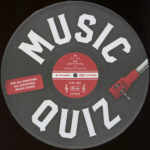(Editor’s Note: Have a musician or band you love? Consider contributing to The Daily Music Break. Send us a note.)
“If she’s amazing, she won’t be easy. If she’s easy, she won’t be amazing. If she’s worth it, you won’t give up. If you give up, you’re not worthy… The truth is, everyone is going to hurt you; you gotta find the ones worth suffering for.” – Bob Marley.
I’ll be honest with you: I’m not a huge fan of reggae or even someone inclined to listen to songs with a slow beat and electric rhythm (bear with my less than an adequate description of Bob Marley’s music). Far from it, my tastes lie almost squarely in the rock and roll genre, occasionally dipping their feet in electronic music and heavy metal. So, you could imagine my reservations when I came across the song “Stir it up” in my YouTube recommendations and accidentally clicked on it (which made me further question the effectiveness of an algorithm I already find annoying). But for once, I have to say, and I was pleasantly surprised.
 Before I could move my mouse cursor to the “Close tab” button, in the first five seconds, I went from annoyed to curious. Within the next 30 seconds of the song, I was already searching for other Marley songs to listen to after I finished this one. The song had an alluring quality to it like one I hadn’t experienced before; it was both quiet and soothing, while at the same time having a strange electronic feel to it which I can only describe as spunky but not quite. Or maybe there is a better word: reggae, for that, is what it was.
Before I could move my mouse cursor to the “Close tab” button, in the first five seconds, I went from annoyed to curious. Within the next 30 seconds of the song, I was already searching for other Marley songs to listen to after I finished this one. The song had an alluring quality to it like one I hadn’t experienced before; it was both quiet and soothing, while at the same time having a strange electronic feel to it which I can only describe as spunky but not quite. Or maybe there is a better word: reggae, for that, is what it was.
Now don’t get me wrong, I wasn’t head over heels over the song, nor was I going to listen to it till I broke the replay button. At heart, I am after all a rock and roll fan. However, in a tiny corner of that same heart, I found space for a song that I hadn’t really invited in but had smilingly made it’s placed there all the same — kind of like how Marley did in the hearts of so many around the world.
About the song
The song in itself is a love song to its core. While Marley’s later work would come to encompass themes like struggle, freedom, and self-discovery, this song was a simple but heartfelt love song Marley sang for his wife. It was also a song from his earlier works, way back in the 1960s . The song was written by Marley himself and The Wailers released it as a single, before it Johnny Nash did a cover on it in his 1972 album “I Can See Clearly Now.” It finally was re-recorded by Marley and the Wailers in 1973 on their album Catch a Fire.
“I’ll push the wood; then I blaze ya fire.
Then I’ll satisfy your heart’s desire.”
Though there are many interpretations to the song’s lyrics, each with its supporting arguments about why it’s the right one, art is subjective and what you get out of it is only what you feel when you experience it. In my case, the one recurring theme I constantly felt throughout the song was warmth; warmth radiating from the metaphors of fire but also warmth radiating from the description of the love and devotion in Marley’s words. And with that warmth came an odd feeling of comfort, something which I wasn’t used to hearing in music, but I found myself welcoming all the same.
A slow beat yet quirky beat, overlaid by only the softest and sincerest of voices carrying words of love; even the toughest of hearts could find a heartstring or two pulled by this song.
About the man
Even among singers who’ve gained fame during and long after they passed away, Bob Marley stands head and shoulders above so many with a status in the industry that’s almost legendary. Put simply, Marley’s work was revolutionary, having been accredited to time and time again as the man who popularized Reggae in the first place, inspiring an entirely new generation to discover and create this music after him. Marley is one singer who gained international recognition through the power of his voice and power, without the power of huge corporations and marketing which most artist today rely on to reach their audience.
But even more impressive than Marley’s music was the man himself, and how much of a cultural icon he was among his people, the Jamaicans. Standing for love, peace and finding yourself, Marley’s words had the power to sway millions. Take his performance Amandla Festival – Harvard Stadium Boston on the 21st of July 1979, where the promoters of the concert themselves kept Marley’s performance in the afternoon, fearing that the power of his words could spark a riot among the audience.
However, all of this influence came at a cost to Marley, who would even be sometimes caught up in the crossfire between two warring factions. This happened on the 3rd of December 1976 when Marley, his wife, and his manager Don Taylor were wounded in an assault by unidentified shooters in Marley’s own home. The attack was believed to have been carried out to prevent Marley from performing at “Smile Jamaica,” a concert organized by then Prime Minister of Jamaica, Michael Manley, in an attempt to cool things down between two political parties. Even though his wife and manager suffered serious injuries, and Marley himself was not left unharmed, he went on stage two days later at the concert as planned. Someone asked him why he didn’t skip the performance to recuperate.
Marley’s reply was simple: “The people who are trying to make this world worse aren’t taking a day off. How can I?”
You don’t need anything else to tell you what kind of man Marley was.

By Adriana Katherine Rosales Márquez, Founder of Akrom Marketing Services


















Recent Comments